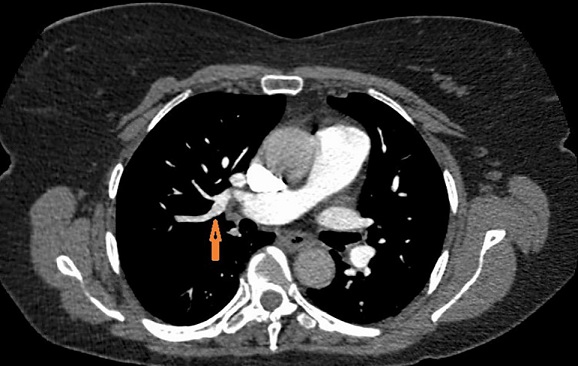Doctors From Cleveland Clinic Warn That While COVID-19 Can Cause GERD, Some COVID-19 Sequelae Can Mimic GI Diseases!
Nikhil Prasad Fact checked by:Thailand Medical News Team Apr 20, 2024 1 year, 9 months, 3 weeks, 5 days, 10 hours, 6 minutes ago
COVID-19 News: The global COVID-19 pandemic has revealed a multitude of ways in which the novel coronavirus, SARS-CoV-2, affects human health. Initially recognized for its respiratory symptoms, COVID-19 has also been implicated in a range of gastrointestinal (GI) manifestations, shedding light on the virus's complex pathophysiology. This
COVID-19 News report delves into the intricate interplay between COVID-19 and gastrointestinal manifestations including gastroesophageal reflux disease (GERD), emphasizing the challenges, diagnostic nuances, and treatment implications associated with GERD post-COVID-19 infection based on a case study and literature review conducted by researchers form Cleveland Clinic- USA. Importantly the study revealed that certain sequelae of COVID-19 can mimic GI issues.
 While COVID-19 Can Cause GERD Some COVID-19 Sequelae Can Mimic GI Diseases
Pulmonary embolus seen on chest CT scan (arrow)
While COVID-19 Can Cause GERD Some COVID-19 Sequelae Can Mimic GI Diseases
Pulmonary embolus seen on chest CT scan (arrow)
CT: computed tomography
Thailand
Medical News had already previously warned that SARS-CoV-2 infections can also cause gastric reflux and dyspepsia.
https://www.thailandmedical.news/news/covid-19-is-also-able-to-cause-gastric-reflux
https://www.thailandmedical.news/news/polish-study-finds-that-exposure-to-sars-cov-2-virus-leads-to-long-lasting-dyspeptic-symptoms
COVID-19's Diverse Impact - Unraveling GI Manifestations
While COVID-19 primarily manifests with respiratory symptoms such as cough, shortness of breath, and congestion, approximately 17% of patients also experience GI symptoms. These symptoms encompass a spectrum ranging from anorexia, nausea, and diarrhea to abdominal pain and vomiting. The underlying mechanisms driving these GI manifestations are multifaceted, encompassing exaggerated inflammatory responses, coagulopathic states, and potential unknown pathogenic pathways.
Case Presentation - GERD as a Sequela of COVID-19
A compelling case study underscores the potential for COVID-19 to masquerade as a GI disorder, particularly GERD. A 64-year-old woman developed refractory GERD symptoms persisting for over 18 months post-COVID-19 infection. Despite standard treatments with proton pump inhibitors (PPIs), her symptoms persisted, prompting further diagnostic evaluations including upper endoscopy and pH monitoring, all of which yielded negative results. However, as her symptoms worsened, leading to hospitalization, a diagnosis of chronic pulmonary embolism (PE) related to COVID-19 was established. Rema
rkably, upon initiation of anticoagulation therapy, her GERD symptoms resolved rapidly, highlighting the intricate connection between COVID-19 sequelae and GI presentations.
Deciphering COVID-19's Gastrointestinal Mimicry
Emerging evidence underscores the association between COVID-19 and coagulopathy, with substantial incidences of venous thromboembolism (VTE) and PE among hospitalized patients. Concurrently, GI symptoms post-COVID-19 recovery, including reflux symptoms, have been observed in a significant proportion of individuals, with potential mechanisms including gut dysbiosis, cytokine storms, medication effects, and autonomic dysfunction. These findings emphasize the need for a holistic approach to understanding COVID-19's impact on the GI system, particularly in cases where GI symptoms persist or present atypically.
Literature Review - COVID-19's Versatile GI Impersonation
A comprehensive review of the literature unveils numerous instances where COVID-19 mimics diverse GI conditions, transcending conventional respiratory paradigms. From mimicking acute abdomen and appendicitis to presenting with pancreatitis and cholangiocarcinoma-like symptoms, COVID-19's ability to impersonate unrelated GI pathologies poses significant diagnostic challenges. These cases underscore the importance of maintaining a high index of suspicion and adopting a nuanced approach to differential diagnosis, especially in the context of post-COVID-19 GI manifestations.
Studies have highlighted a link between COVID-19 infection and coagulopathy, with incidences of venous thromboembolism (VTE) and pulmonary embolism (PE) reported in hospitalized patients. In a systematic review involving 9,249 patients, the pooled incidence of VTE and PE was 21.6% and 11.8%, respectively. The severe inflammatory response seen in COVID-19, characterized by endothelial dysfunction, endothelitis, and elevated prothrombotic factors, contributes to a hypercoagulable state. Additionally, pulmonary embolisms have been observed post-recovery from acute COVID-19 infection, sometimes presenting with unexplained chronic cough.
Regarding gastrointestinal (GI) symptoms, studies have noted their occurrence in approximately 29% of patients six months after recovering from COVID-19, with reflux symptoms reported in 27%. A survey in Indonesia found an increased rate of GERD during the pandemic compared to the pre-pandemic period. The exacerbation of GERD symptoms has been linked to restrictive lockdown measures, and new-onset GERD symptoms post-COVID-19 infection can persist for over a year, potentially due to gut dysbiosis, cytokine storms, COVID-19 medications, and autonomic dysfunction.
The case reported by the doctors from Cleveland clinic underscores how COVID-19's sequelae, such as PE, can manifest as long-term GI ailments like GERD, with resolution following appropriate treatment.
The review of literature has highlighted COVID-19's ability to mimic various GI conditions, including acute abdomen, appendicitis, multi-system inflammatory syndrome, internal hernia, acute pancreatitis, liver failure, cholangiocarcinoma-like presentations, and long COVID-associated GI symptoms. These cases underscore the need for a comprehensive approach to diagnosis, considering COVID-19's diverse clinical presentations beyond respiratory symptoms.
Conclusion
In conclusion, COVID-19's impact extends far beyond its initial characterization as a respiratory syndrome, encompassing a diverse array of GI manifestations with significant clinical implications. The case of GERD post-COVID-19 infection serves as a poignant example, highlighting the intricate interplay between COVID-19 sequelae and GI disorders. Clinicians must remain vigilant for atypical presentations and consider COVID-19 in the differential diagnosis, particularly in cases of refractory GERD. Future research endeavors should delve deeper into the underlying mechanisms driving COVID-19's versatile GI effects, paving the way for enhanced diagnostics, targeted therapies, and improved patient outcomes in this evolving landscape of viral gastroenterology.
The case study and findings from a literature review were published in the peer reviewed journal: Cureus.
https://www.cureus.com/articles/238636-covid-19-and-its-sequelae-masquerading-as-gastrointestinal-ailments-a-report-of-gastroesophageal-reflux-disease-gerd-and-review-of-recent-cases#!/
For the latest
COVID-19 News, keep on logging to Thailand Medical News.
Read Also:
https://www.thailandmedical.news/news/health-news-university-of-minnesota-study-finds-that-long-term-use-of-ppis-for-gastric-reflux-linked-to-higher-risk-of-developing-dementia
https://www.thailandmedical.news/news/covid-19-warning-malaysian-led-research-shows-that-gastric-reflux-drugs-ppis-linked-to-increased-risk-of-severe-or-fatal-covid-19-outcome
https://www.thailandmedical.news/news/breaking-news-covid-19-alert-research-led-by-cedars-sinai-indicates-that-proton-pump-inhibitors-ppis-use-is-linked-to-increased-risk-of-covid-19
https://www.thailandmedical.news/news/more-studies-emerging-that-ppis-(proton-pump-inhibitors)-linked-to-increased-risks-of-deaths
https://www.thailandmedical.news/news/as-evidence-of-damage-from-long-term-ppi-use-mounts,-thai-medical-providers-should-rethink-strategies-to-treat-acid-reflux
https://www.thailandmedical.news/news/new-study-links-ppis-to-kidney-disease-and-failure
https://www.thailandmedical.news/news/proton-pump-inhibitors-(ppis)-and-antibiotics-linked-to-increased-infectious-diarrhea-in-children
https://www.thailandmedical.news/news/acid-reflux-medications-and-proton-pump-inhibitors-(ppis)-linked-to--kidney-disease
https://www.thailandmedical.news/news/more-bad-news-for-users-of-proton-pump-inhibitors-(ppis),-as-these-gastric-reflux-drugs-are-implicated-in-cholangitis
https://www.thailandmedical.news/news/proton-pump-inhibitors-ppis-increases-risk-of-fatty-liver-disease-by-disrupting-gut-microbiome-balance-according-to-korean-study
https://www.thailandmedical.news/news/ppis-or-acid-reflux-drugs-affects-cognitive-abilities-of-breast-cancer-survivors
https://www.thailandmedical.news/news/study-finds-another-negative-side-effect-of-ppi-usage,-this-time-linked-to-increased-risk-of-acute-gastroenteritis
https://www.thailandmedical.news/news/how-low-can-some-american-doctors-get,-prescribing-ppis-to-babies-and-young-children
https://www.thailandmedical.news/news/warning-zantac-ranitidine-disintegrates-into-a-carcinogenic-compound
https://www.thailandmedical.news/news/us-fda-says-gastric-reflux-drug,-zantac-(ranitidine)-found-to-contain-carcinogen
